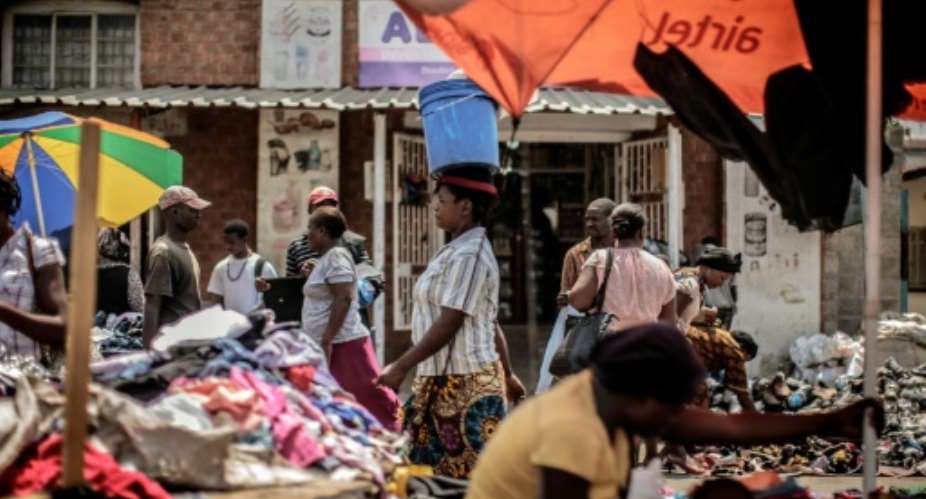For days on end, Mildred Mwenya hasn't seen so much as the shadow of a customer in her pharmacy in the Zambian capital Lusaka.
Today, her stomach was as empty as her premises. She had been unable to afford breakfast before coming to open the store.
She is one of a growing number of victims in Zambia of a double hit -- a macro-economic crisis combined with the coronavirus pandemic.
"When we come for work, we have no customers and not even food to eat for the morning," says Mwenya, from behind her counter.
"When you go to order goods and the following day the prices increase, business is bad," she explains.
"Those who use transport are affected and we also need to pay rent for the shop."
A landlocked country in southern Africa, and the world's second-largest copper producer, Zambia has been lashed by a plunge in commodity prices.
Starved of income, the government announced in mid-November that the country would no longer pay creditors -- and the prices of basic goods began to rise.
Debt spiral
The nation of 17 million people has a foreign debt estimated at nearly $12 billion, half of which comes from private creditors. Much is owed to China.
In mid-October, Zambia missed the deadline to honour a payment of $42.5 million due on a bond worth $750 million which matures in 2022.
The global rating agency Standard & Poor's relegated the country to the "selective default" category.
Once classified as a defaulter, a country undergoes penalties that further increase the cost of servicing its debts, said economist Mambo Hamaundu.
"You won't have money to buy medicines in hospitals, chalks for our schools, because more money would have moved away from the treasury," Hamaundu says. "If there is no money in the treasury the ordinary citizens will suffer."
"This will mean that sectors like health, agriculture and education will be affected," said Nalucha Ziba, country director for the charity ActionAid.
'Eating once a day'
That warning is borne out by the evidence on the streets of Lusaka.
 Zambia was hit by poor harvests in 2018 and 2019 - nearly half its population is unable to meet minimum calorie requirements, the UN says. By Guillem Sartorio (AFP)
Zambia was hit by poor harvests in 2018 and 2019 - nearly half its population is unable to meet minimum calorie requirements, the UN says. By Guillem Sartorio (AFP)
In some stores, the price of maize flour used to prepare "mealie meal", a porridge that constitutes Zambia's staple food, has gone up by more than 12 percent in three weeks -- a sack of 25 kilograms (55 pounds) now costs 141 kwacha (5.45 euros, $6.66).
Esther Kalaba, a widowed mother with three children who lives in Lusaka, says life has become cripplingly expensive.
"I have resorted to eating once a day," she says.
Employed as a cleaning lady with a monthly salary just under 750 kwacha, Kalaba must produce rent of 500 kwacha each month.
She is left with the equivalent of around $10 each month to keep her family alive. By way of comparison, that is less than the price of three kilos of potatoes, the price of which has risen by 30 percent.
Some medicines have started to run out and "taking care of yourself has become costly," says Bright Mapiki, who runs a Lusaka chemist's shop.
In the Chazanga shanty town north of the city, Martin Mooya can no longer afford school fees for his children. All that he earns from a small store is swallowed up by the daily shopping bill.
"I am struggling to make ends meet and the situation has been worsened by the debt default by our government," he says.
"Come next year I am voting this government out."





 NDC demands complete overhaul of security protocols at EC to safeguard electoral...
NDC demands complete overhaul of security protocols at EC to safeguard electoral...
 Ghana reaches interim deal with international bondholders — Finance Ministry
Ghana reaches interim deal with international bondholders — Finance Ministry
 Mahama to form joint army-police anti-robbery squads to safeguard 24-hour econom...
Mahama to form joint army-police anti-robbery squads to safeguard 24-hour econom...
 Another man jailed eight months over shrinking penis
Another man jailed eight months over shrinking penis
 Ghana to adjust external bond deal to meet IMF debt sustainability goals — Finan...
Ghana to adjust external bond deal to meet IMF debt sustainability goals — Finan...
 IMF negotiations: We've not failed to reach an agreement with bondholders; we’ve...
IMF negotiations: We've not failed to reach an agreement with bondholders; we’ve...
 EC begins recruitment of temporary electoral officials, closes on April 29
EC begins recruitment of temporary electoral officials, closes on April 29
 NPP lost the 2024 elections in 2022 due to inflation and cedi depreciation — Mar...
NPP lost the 2024 elections in 2022 due to inflation and cedi depreciation — Mar...
 Your good heart towards Ghana has changed; don’t behave like Saul - Owusu Bempah...
Your good heart towards Ghana has changed; don’t behave like Saul - Owusu Bempah...
 Wa West: NDC organizes symposium for Vieri Ward Women
Wa West: NDC organizes symposium for Vieri Ward Women
